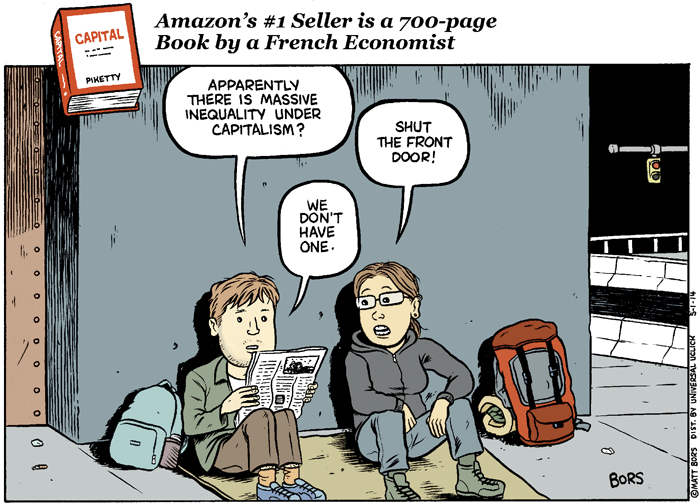“When the rate of return of return on capital exceeds the rate of growth of output and income, as it did in the nineteenth century and seems quite likely to do again in the twenty-first, capitalism automatically generates arbitrary and unsustainable inequalities that radically undermine the meritocratic values on which which democratic societies are based.” – quote from the book “Capital in the Twenty-First Century” by economist Thomas Piketty.
Even though the book is 700 pages long and is translated from the original French, it has hit #1 on the Amazon best sellers list. Nobel prize winning economist Paul Krugman calls it a “magnificent, sweeping meditation on inequality” that “melds grand historical sweep with painstaking data analysis”. The book uses pioneering statistical techniques to track the history of income inequality, back as far as the late 18th century in some cases.
And what he found was that the income going to the 1% is now back to where it was a century ago. Even worse, our income inequality is not based on merit (as some would claim), but is once again being passed down through family dynasties.
Which sounds awfully like the situation we were in just before the great depression.



4 Comments
Are terms capitalism and free market interchangeable? Do they mean/imply same set of rules?
Second question, is US one of the above? I can say it with certainty it is not free market (your posts about Tesla motors etc). I mean I cannot believe bailing out ultra rich people when they are falling below “richness” line can be considered free market (but not sure about capitalism, that is why I asked if it is same thing).
Not necessarily. At its root, capitalism just says that the means of production are privately owned and goods are exchanged in a market structure. Most people take this to mean that the market must be completely free, but that’s not technically true. It’s also not realistic at all. In practice, economic transactions typically have externalities, which are costs borne by third parties. As such, a truly free market is completely undesirable, because it forces some people to subsidize market transactions to which they are not a part.
Consequently, no, the U.S. is not a free market. Nor is any other country. Nor will any country ever be.
No they are not interchangeable.
I agree with what Michael says, but I would take it one step further and say that a completely free is not just undesirable, it is in fact impossible. There has to be some party (typically the government) that enforces property ownership and rights, which is a form of regulation. A completely free market in the most general sense would be anarchy or feudalism, neither of which would support capitalism.
There are also some products, such as alcohol, that are regulated as to who can buy or sell them and under what conditions.